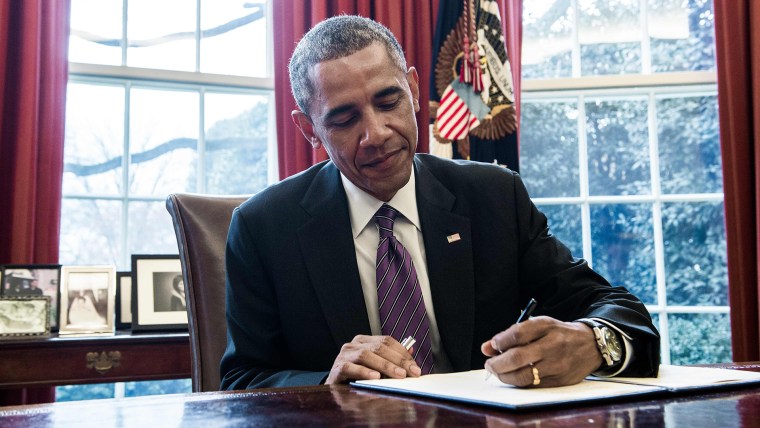President Obama repeatedly told Congress not to waste its time passing legislation on the Keystone XL oil pipeline -- if they did, he'd veto it. Lawmakers would be better off investing their energies in bills that could become law.
The Republican-led House and Senate, evidently eager to help the economy in Alberta, Canada, ignored the warnings and passed their proposal. This afternoon, the president kept his word, issuing the following message to lawmakers:
"I am returning herewith without my approval S. 1, the 'Keystone XL Pipeline Approval Act.' Through this bill, the United States Congress attempts to circumvent longstanding and proven processes for determining whether or not building and operating a cross-border pipeline serves the national interest. "The Presidential power to veto legislation is one I take seriously. But I also take seriously my responsibility to the American people. And because this act of Congress conflicts with established executive branch procedures and cuts short thorough consideration of issues that could bear on our national interest -- including our security, safety, and environment -- it has earned my veto."
Republicans are, predictably, outraged by the outcome they knew all along would happen, calling the veto "political." It's not -- this has always been more of a policy fight than a political food fight.
But more important is the degree to which this veto very likely marks the beginning of a new era for Obama's presidency.
As Rachel noted on the show last night, "This is a big deal."
"Both the Democrats and Republicans think that President Obama vetoing this thing is going to be great for them. President Obama has never vetoed any meaningful legislation in the six years he's been in office, but now that Congress is in control of the Republicans and they are trying to send him bills they know he will not sign, we are now onto a new era in American politics."Welcome to the veto era."
Quite right. There were a couple of minor, technical vetoes from Obama early on, but in terms of meaningful legislation, today is a first. Up until this year, this president has had at least one chamber of Congress controlled by his own party, but now that the GOP dominates all of Capitol Hill, the governing dynamic is entirely new -- among two-termers, Obama has made fewer vetoes than any president since Abraham Lincoln, though this president's total is very likely to start growing in a hurry.
As for the substance of the legislation itself, let’s recap
our discussion from a few weeks ago, noting just how straightforward the case against Keystone is. At issue is a proposal to build a pipeline to transport oil, extracted from tar sands, from Canada to the Gulf of Mexico. Critics have said the tar-sands process is environmentally hazardous, which is true. They’ve said the project would have no real impact on already low gas prices, which is also true. And they’ve said Keystone would be largely meaningless to the U.S. unemployment rate, which, once again, is completely true.
And on the other side of the aisle, Republicans have an equally straightforward rejoinder: they really, really, really like this project. Why? Because they really, really, really do.
Let’s acknowledge what too often goes unsaid: for Republicans, the Keystone XL pipeline is no longer about the Keystone XL pipeline. It’s just one oil project – one that would have no discernable effect on anything, except maybe the economy in western Canada (not that I have anything against western Canada’s economy).
Rather, Keystone has become a totem of sorts. Its actual value has been rendered meaningless, replaced with post-policy symbolic value that ignores pesky details like facts and evidence. Indeed, the more Democrats and environmentalists tell Republicans this is a bad idea, the more Republicans convince themselves this is The Most Important Project In The World. It’s ideologically satisfying.
Taking this one step further, my suspicion is that GOP officials find all of these circumstances quite convenient. Republicans don’t have a jobs agenda, or much of an economic vision in general, but they have a Keystone bill that those rascally Democrats won’t accept.
And when pressed for an explanation on why congressional Republicans aren’t working on economic development, they immediately turn to their talking point of choice: “Keystone! Keystone! Keystone!”
It’s almost sad. NBC’s First Read did a nice job recently describing the fight
as small ball: “We’ve got to ask: All that money spent on the midterms, all that jockeying for control of the Senate, and first real statement from the new GOP majority is Keystone? It’s small-ball politics, whether you’re on the right, left or in the middle. It’s certainly no Contract with America.”
